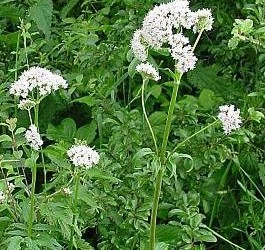|
Gardens Ablaze |
||
|
|
Medicinal
Uses of Valerian |
|
|
Additional Valerian Information
Growing Valerian Site Map
Home |
Valerian root is the part of the plant that is used for medicinal purposes. The root can be distilled into oils and ointments, or dried and used in teas or capsules. Please see the links below for specifics on how to make fresh or dried root into homemade medications. Obviously, you can also buy prepared Valerian online or at any health food store. Valerian has a fairly wide range of uses in the home medicine cabinet. It is an effective stress reducer, and has benefit in cases of nervous tension, depression, irritability, hysteria, panic, anxiety, fear, stomach cramping, indigestion due to nervousness, delusions, exhaustion, and, of course, nervous sleeplessness. It also appears to have real benefits in cases of sciatica, multiple sclerosis, epilepsy, shingles, and peripheral neuropathy, including numbness, tingling, muscle weakness, and pain in the extremities. Testing has also revealed that it eases muscle cramping, rheumatic pain, migraines, uterine cramps, intestinal colic, and stress-related heart problems and hypertension. It has shown some benefit in behavioral problems in both adults and children, and is used to treat attention deficit disorders, hyperactivity, anxiety headaches, and bedwetting, and it has shown some promise in helping reduce thumb sucking and nail biting in children. It has a stabilizing effect on blood pressure and can help regulate arrhythmias. Lastly, Valerian is useful as a digestive aid, is helpful in cases of gas, diarrhea, and cramps, and alleviates the pain of ulcers. In the respiratory tract, it is believed to be of benefit in reducing the discomfort of asthma attacks. Valerian is contraindicated in pregnant and breast feeding women, but otherwise is a safe herb to use intermittently when needed for stress or sleep related problems. It is not recommended that you use it every day, however. Overdose is unlikely, so experiment with dosages that work best for you. The usual dose with an oil is 1 teaspoon as needed, and with a tea or capsule, 1-2 cups or tablets as needed.
Custom Search
|
|
|
Gardens Ablaze |
||
 Valerian
is a central nervous system relaxer, and as such has been used as a calming
sleep aid for over 1,000 years. When taken in the proper dosage, Valerian
can induce restful sleep without grogginess the next morning, unlike prescription
drugs that mimic it's properties, such as Valium. It is also much
safer when used with alcohol, as it doesn't magnify the effects of alcohol
as do it's prescription counterparts. It is widely used in Europe,
and is rapidly gaining popularity in the United States as more people discover
it's beneficial properties.
Valerian
is a central nervous system relaxer, and as such has been used as a calming
sleep aid for over 1,000 years. When taken in the proper dosage, Valerian
can induce restful sleep without grogginess the next morning, unlike prescription
drugs that mimic it's properties, such as Valium. It is also much
safer when used with alcohol, as it doesn't magnify the effects of alcohol
as do it's prescription counterparts. It is widely used in Europe,
and is rapidly gaining popularity in the United States as more people discover
it's beneficial properties.